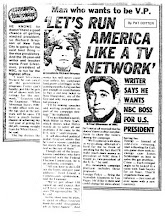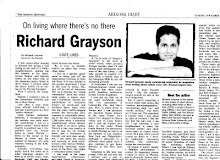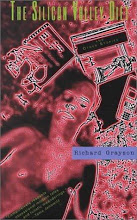
We were sorry to learn in an obituary notice in the New York Times today of the death of John W. Kneller, who was the president of Brooklyn College during the turbulent decade of the 1970s.
Dr. Kneller, a French scholar who'd previously served as president of Oberlin, came to BC pretty much when we did, forty years ago this fall - we attended his formal investiture - and served during our whole undergraduate and graduate career there.
We got to know him pretty well. Somewhere is a pic of us together with Stella Albo, at a summer 1970 party to commemorate the first day care center at Brooklyn College, which Stella and others fought for on behalf of the growing number of students who were parents.
Our student government friend Gary Hayden was on the search committee that recommended Dr. Kneller's appointment. He told the New York Times on August 13, 1969, that Dr. Kneller "just stood out" among the 100 candidates that were considered for the job. "Suddenly we knew this was it," Gary is quoted as saying. adding that Dr. Kneller was "very, very good on issues that were relevant to college life."

Mostly we met Dr. Kneller when we were protesting something or other, often some of his own actions that we students thought were wrong-headed. When we both first arrived at BC, the new President was interviewed by the editor-in-chief of the day student government newspaper The Ol' Spigot, Paul Schickler, who titled his column "Nervous Knelly," because Dr. Kneller struck him as someone afraid to take definite stands. Among us students, and perhaps the wider academic community, he had the reputation of being wishy-washy if well-meaning.
On the Tuesday after the Kent State killings in May 1970, a sympathetic Dr. Kneller joined us in protest at a memorial service, but his support seemed less than an adequate response to us, and later that afternoon, we students took over his office and commandeered the college during the nationwide student strike that ended the semester abruptly at City University of New York and across the U.S.

A New York Times article from May 10, 1970, noted:
At Brooklyn College, 100 students continued to remain in the office of the president, John W. Kneller, in Boylan Hall, where they have been since the beginning of a student strike last Tuesday.
John W. Kneller, the president of Brooklyn College, issued a statement last night "terminating all classes for the remainder of the semester." College buildings will remain open, he said, to provide student and faculty groups with office space so that they can work for peace.

We remember other occasions when we were across the table and on opposite sides from President Kneller, like the time SO FED UP (we can't recall what the acronym stood for), the first activist group of what we then called 'handicapped' students sat in in his office, demanding access ramps on college buildings.
At firt Dr. Kneller seemed unreasonable in his opposition to such accommodations, but in the end we knew that if we pressured him enough, he'd give in. He did, and of course access for the disabled was, nearly twenty years later, mandated by the federal Americans with Disabilities Act (ADA).
A New York Times article on October 26, 1974, about the protests over the choosing of a chairman for the new Puerto Rican Studies Department is illustrated with a photo of students, some of whom are seen carrying signs that say PAPA KNELLER MUST GO. The article says that student supporters of Prof. Maria Sanchez, who had been passed over for the position despite being recommended by a faculty/student search committee, "a group of students occupied the office of the president, John W. Kneller, last Friday demanding her appointment."
It was a difficult time to be a college president, the 1970s, and by the end of the decade and his tenure at Brooklyn College, the faculty council (we served for two years as a student representative on the faculty council's curriculum committee and so attended more contentious meetings than we would have liked) had passed a "no confidence" resolution regarding Dr. Kneller's administration, and he was eventually replaced by a more hard-line but much less well-liked college president.
After his resignation, Dr. Kneller, in an interview with the New York Times on December 3, 1978, acknowledged shortcomings in his administration, but said many of its problems were caused by vindictive faculty members who were unable to obtain special favors:
"We've proven by the record of our students and the record of our faculty that we were able to perform our function in the City of New York and maintain our excellence under the most adverse conditions," he said, referring to the city's fiscal crisis and its devastating impact on the City University. . .
"We've had our successes but we've also had our failures". . . Turning to his accomplishments, Dr. Kneller pointed to the fine reputation of many departments, including art, chemistry, psychology and the School of Performing Arts, as well as the creation of new ones, such as women's studies, computer science and Puerto Rican studies.
He noted with pride that Brooklyn College students had among the highest acceptance rates to medical school and law school and that they had achieved the highest score in the nation on the Dental Admission Test last spring.
Looking ahead, Dr. Kneller approached his return to teaching with enthusiasm. "I think it's a marvelous opportunity, and it's the way I'd like to spend the rest of my career."
"It's never been a question of whether I'd leave the presidency, but when."
Jack Kneller was basically a nice guy. We were invited to his house on Marlborough Road on a few occasions. He was a great father to his daughter, an acquaintance of ours, and he loved horses and was a great rider.
He was a kindly, friendly man who had a long and distinguished career as professor of French literature, first at Oberlin College and then at Hunter College and the CUNY Graduate Center. He served as associate editor of Yale French Studies and editor-in-chief of The French Review. He wrote seminal criticism of the authors Gérard de Nerval and Henri Peyre, but for us, Dr. Kneller's insights into Marcel Proust's masterpiece In Search of Lost Time were particularly brilliant.

We asked Borough President Marty Markowitz for a comment and he wrote us:
I graduated Brooklyn College in 1970 and Dr Kneller's service began in 1969. My memories of him while I was President of Evening Student government took place on campus during the height of the anti Vietnam and Black Empowerment movement. His passing saddens all of us.
Dr. Kneller dedicated a decade of his life to Brooklyn College, and he and his family were great supporters of the Brooklyn Botanic Gardens and other Brooklyn cultural institutions. We will miss him.

































No comments:
Post a Comment